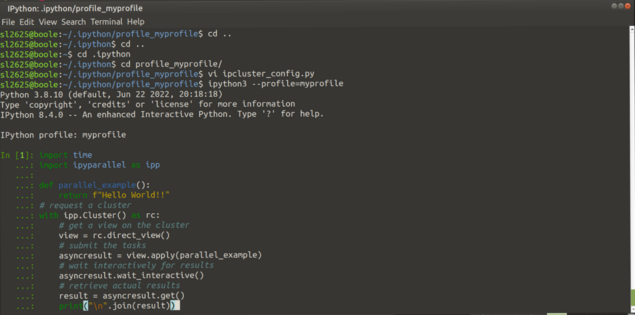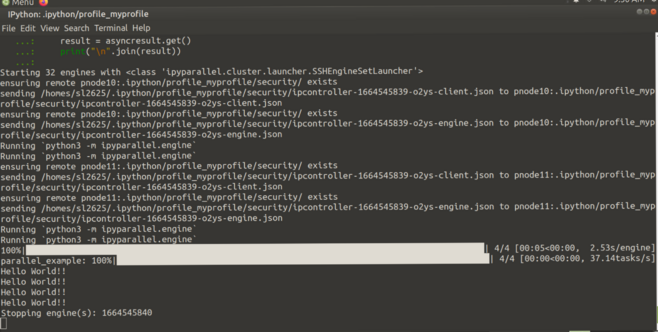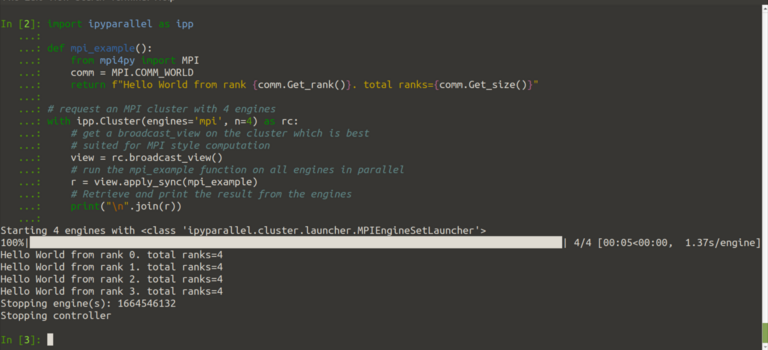Difference between revisions of "Configuring Ipython for Parallel Computing"
m |
|||
| (One intermediate revision by the same user not shown) | |||
| Line 5: | Line 5: | ||
==== Step 2. We modify ipcluster_config.py so that engines are launched in remote machines and controller is launched on local machine ==== |
==== Step 2. We modify ipcluster_config.py so that engines are launched in remote machines and controller is launched on local machine ==== |
||
| − | $ cd <NetID>/.ipython/profile_myprofile |
+ | $ cd <NetID>/.ipython/profile_myprofile |
| + | |||
| − | |||
| − | $ vi ipcluster_config.py |
+ | $ vi ipcluster_config.py |
Now in this file we modify the following (uncomment the line and make the changes as shown): |
Now in this file we modify the following (uncomment the line and make the changes as shown): |
||
| − | c.Cluster.engine_launcher_class = 'ssh' |
+ | c.Cluster.engine_launcher_class = 'ssh' -->line 528 |
| + | |||
| − | |||
| − | c.SSHControllerLauncher.controller_args = ['--ip=*'] |
+ | c.SSHControllerLauncher.controller_args = ['--ip=*'] -->line 1689 |
| + | |||
| − | |||
| − | c.SSHEngineSetLauncher.engines = {'pnode10':2,'pnode11':2} -->line 2423 |
+ | c.SSHEngineSetLauncher.engines = {'pnode10':2,'pnode11':2} -->line 2423 |
Save the file and exit. Note that in the c.SSHEngineSetLauncher.engines field, you need to put which machines (ramsey,fibonacci,etc) or nodes (pnode01,02,etc) and how many kernels you want from each. In my example I have taken 2 each from pnode10 and pnode11 |
Save the file and exit. Note that in the c.SSHEngineSetLauncher.engines field, you need to put which machines (ramsey,fibonacci,etc) or nodes (pnode01,02,etc) and how many kernels you want from each. In my example I have taken 2 each from pnode10 and pnode11 |
||
| Line 21: | Line 21: | ||
Next, in file ipcontroller_config.py in the same location: |
Next, in file ipcontroller_config.py in the same location: |
||
| − | c.IPController.ip = '0.0.0.0' |
+ | c.IPController.ip = '0.0.0.0' |
Save and exit file. This step is important because otherwise the controller won't be able to listen on the engines and no parallel computation will happen. |
Save and exit file. This step is important because otherwise the controller won't be able to listen on the engines and no parallel computation will happen. |
||
| − | ==== |
+ | ====Step 3. With this you should have parallel computing set up. Examples with IPython and MPI==== |
| − | ====== |
+ | ======Only IPython====== |
Launch IPython with the profile you created and edited: |
Launch IPython with the profile you created and edited: |
||
| − | $ ipython3 --profile=myprofile |
+ | $ ipython3 --profile=myprofile |
| + | |||
| − | |||
Code: |
Code: |
||
| − | import time |
+ | import time |
| + | |||
| − | |||
| − | import ipyparallel as ipp |
+ | import ipyparallel as ipp |
| + | |||
| − | |||
| − | def parallel_example(): |
+ | def parallel_example(): |
| + | |||
| − | |||
| − | + | return f"Hello World!!" |
|
| + | |||
| − | |||
| − | <nowiki>#</nowiki> request a cluster |
+ | <nowiki>#</nowiki> request a cluster |
| + | |||
| − | |||
| − | with ipp.Cluster() as rc: |
+ | with ipp.Cluster() as rc: |
| + | |||
| − | |||
| − | # get a view on the cluster |
+ | # get a view on the cluster |
| + | |||
| − | |||
| − | + | view = rc.load_balanced_view() |
|
| + | |||
| − | |||
| − | + | # submit the tasks |
|
| + | |||
| − | |||
| − | + | asyncresult = view.map_async(parallel_example) |
|
| + | |||
| − | |||
| − | + | # wait interactively for results |
|
| + | |||
| − | |||
| − | + | asyncresult.wait_interactive() |
|
| + | |||
| − | |||
| − | + | # retrieve actual results |
|
| + | |||
| − | |||
| − | + | result = asyncresult.get() |
|
| + | |||
| − | |||
| − | + | print("\n".join(result)) |
|
| + | |||
| − | |||
[[File:IPython_Parallel_Computing_Example.png|alt=|frameless|635x635px]] |
[[File:IPython_Parallel_Computing_Example.png|alt=|frameless|635x635px]] |
||
| Line 72: | Line 72: | ||
[[File:IPython_Parallel_Computing_Result_1.png|link=https://e.math.cornell.edu/wiki/index.php/File:IPython%20Parallel%20Computing%20Result%201.png|alt=|655x655px]][[File:IPython_Parallel_Computing_Result_2.png|link=https://e.math.cornell.edu/wiki/index.php/File:IPython%20Parallel%20Computing%20Result%202.png|alt=|frameless|658x658px]] |
[[File:IPython_Parallel_Computing_Result_1.png|link=https://e.math.cornell.edu/wiki/index.php/File:IPython%20Parallel%20Computing%20Result%201.png|alt=|655x655px]][[File:IPython_Parallel_Computing_Result_2.png|link=https://e.math.cornell.edu/wiki/index.php/File:IPython%20Parallel%20Computing%20Result%202.png|alt=|frameless|658x658px]] |
||
| − | ====== |
+ | ======Example with MPI====== |
| − | Code (taken from |
+ | Code (taken from [https://ipyparallel.readthedocs.io/en/latest/ here]): |
| − | |||
| ⚫ | |||
| − | |||
| ⚫ | |||
| − | |||
| ⚫ | |||
| − | |||
| ⚫ | |||
| − | |||
| ⚫ | |||
| − | |||
| ⚫ | |||
| − | |||
| ⚫ | |||
| − | |||
| ⚫ | |||
| − | |||
| ⚫ | |||
| − | |||
| ⚫ | |||
| − | |||
| ⚫ | |||
| − | |||
| ⚫ | |||
| − | |||
| ⚫ | |||
| ⚫ | |||
| ⚫ | |||
| + | |||
| ⚫ | |||
| + | |||
| ⚫ | |||
| + | |||
| ⚫ | |||
| + | |||
| ⚫ | |||
| + | |||
| ⚫ | |||
| + | |||
| ⚫ | |||
| + | |||
| ⚫ | |||
| + | |||
| ⚫ | |||
| + | |||
| ⚫ | |||
| + | |||
| ⚫ | |||
| + | |||
| ⚫ | |||
| + | |||
| ⚫ | |||
| + | |||
| ⚫ | |||
Result: |
Result: |
||
Latest revision as of 10:16, 13 October 2022
Step 1. From Terminal run following command to create a parallel profile
$ ipython3 profile create --parallel --profile=myprofile
If this is completed successfully, then there should be some config files like ipcontroller_config.py, ipcluster_config.py, etc in the folder <NetID>/.ipython/profile_myprofile. Check this folder, if you are missing these config files, there might be some issue with the installation of IPython on the system.
Step 2. We modify ipcluster_config.py so that engines are launched in remote machines and controller is launched on local machine
$ cd <NetID>/.ipython/profile_myprofile $ vi ipcluster_config.py
Now in this file we modify the following (uncomment the line and make the changes as shown):
c.Cluster.engine_launcher_class = 'ssh' -->line 528
c.SSHControllerLauncher.controller_args = ['--ip=*'] -->line 1689
c.SSHEngineSetLauncher.engines = {'pnode10':2,'pnode11':2} -->line 2423
Save the file and exit. Note that in the c.SSHEngineSetLauncher.engines field, you need to put which machines (ramsey,fibonacci,etc) or nodes (pnode01,02,etc) and how many kernels you want from each. In my example I have taken 2 each from pnode10 and pnode11
Next, in file ipcontroller_config.py in the same location:
c.IPController.ip = '0.0.0.0'
Save and exit file. This step is important because otherwise the controller won't be able to listen on the engines and no parallel computation will happen.
Step 3. With this you should have parallel computing set up. Examples with IPython and MPI
Only IPython
Launch IPython with the profile you created and edited:
$ ipython3 --profile=myprofile
Code:
import time
import ipyparallel as ipp
def parallel_example():
return f"Hello World!!"
# request a cluster
with ipp.Cluster() as rc:
# get a view on the cluster
view = rc.load_balanced_view()
# submit the tasks
asyncresult = view.map_async(parallel_example)
# wait interactively for results
asyncresult.wait_interactive()
# retrieve actual results
result = asyncresult.get()
print("\n".join(result))
On execution of this code:
Example with MPI
Code (taken from here):
import ipyparallel as ipp
def mpi_example():
from mpi4py import MPI
comm = MPI.COMM_WORLD
return f"Hello World from rank {comm.Get_rank()}. total ranks={comm.Get_size()}"
# request an MPI cluster with 4 engines
with ipp.Cluster(engines='mpi', n=4) as rc:
# get a broadcast_view on the cluster which is best
# suited for MPI style computation
view = rc.broadcast_view()
# run the mpi_example function on all engines in parallel
r = view.apply_sync(mpi_example)
# Retrieve and print the result from the engines
print("\n".join(r))
Result:



